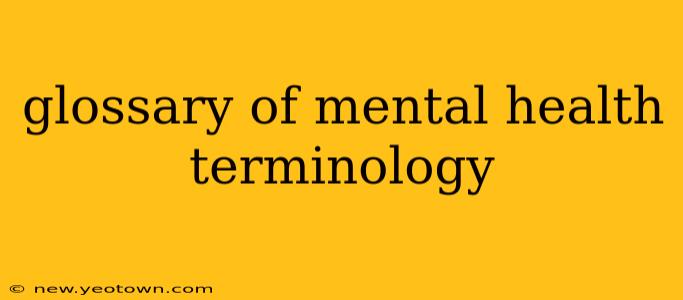Navigating the world of mental health can feel like deciphering a foreign language. The terminology can be complex, confusing, and even intimidating. This glossary aims to demystify some of the most common terms, offering clear explanations and context to help you better understand this crucial area of well-being. Think of this as your friendly guide through the sometimes-winding paths of mental health understanding.
What is Mental Health?
Before we dive into specific terms, let's establish a foundational understanding. Mental health encompasses our emotional, psychological, and social well-being. It influences how we think, feel, and act. It also helps determine how we handle stress, relate to others, and make choices. Mental health is a spectrum, not a binary state of "healthy" or "unhealthy." Just like physical health, it fluctuates, and everyone experiences ups and downs.
Common Mental Health Terms Explained
Let's unravel some of the common terms you might encounter in discussions about mental health:
Anxiety:
This is a feeling of unease, worry, or nervousness, typically about an imminent event or something with an uncertain outcome. It's a normal human experience, but when it becomes excessive, persistent, and interferes with daily life, it can be classified as an anxiety disorder. Anxiety disorders encompass conditions such as generalized anxiety disorder (GAD), panic disorder, social anxiety disorder, and specific phobias.
Depression:
More than just sadness, depression is a mood disorder characterized by persistent feelings of sadness, loss of interest or pleasure, changes in sleep or appetite, fatigue, and difficulty concentrating. It significantly impacts daily functioning and can manifest in various forms, including major depressive disorder, persistent depressive disorder (dysthymia), and postpartum depression.
Trauma:
Trauma refers to deeply distressing or disturbing experiences that overwhelm an individual's ability to cope. These experiences can range from single events (e.g., accidents, assaults) to prolonged abuse or neglect. Trauma can lead to various mental health challenges, including post-traumatic stress disorder (PTSD), anxiety disorders, and depression.
Post-Traumatic Stress Disorder (PTSD):
PTSD is a mental health condition that can develop after a person has experienced or witnessed a terrifying event. Symptoms include flashbacks, nightmares, avoidance of reminders of the trauma, and hypervigilance. PTSD can significantly impact a person's daily life and relationships.
Schizophrenia:
A chronic brain disorder affecting a person’s ability to think, feel, and behave clearly. Symptoms can include hallucinations, delusions, disorganized thinking, and difficulty with social interactions.
Bipolar Disorder:
Characterized by extreme shifts in mood, energy, and activity levels. Individuals with bipolar disorder experience periods of intense highs (mania or hypomania) and lows (depression).
Obsessive-Compulsive Disorder (OCD):
OCD involves recurrent, unwanted thoughts (obsessions) that lead to repetitive behaviors or mental acts (compulsions). These obsessions and compulsions are time-consuming and cause significant distress.
ADHD (Attention-Deficit/Hyperactivity Disorder):
ADHD is a neurodevelopmental disorder characterized by inattention, hyperactivity, and impulsivity. Symptoms can vary greatly, and ADHD can affect individuals throughout their lives.
Autism Spectrum Disorder (ASD):
ASD is a neurodevelopmental disorder that affects social interaction, communication, and behavior. It's a spectrum, meaning symptoms vary widely among individuals.
How Can I Learn More?
This glossary provides a starting point. For more in-depth information, consult reliable resources like the National Institute of Mental Health (NIMH) or the National Alliance on Mental Illness (NAMI). Remember, seeking professional help is a sign of strength, not weakness. If you or someone you know is struggling with their mental health, please reach out to a mental health professional or a support group. Your well-being matters.

